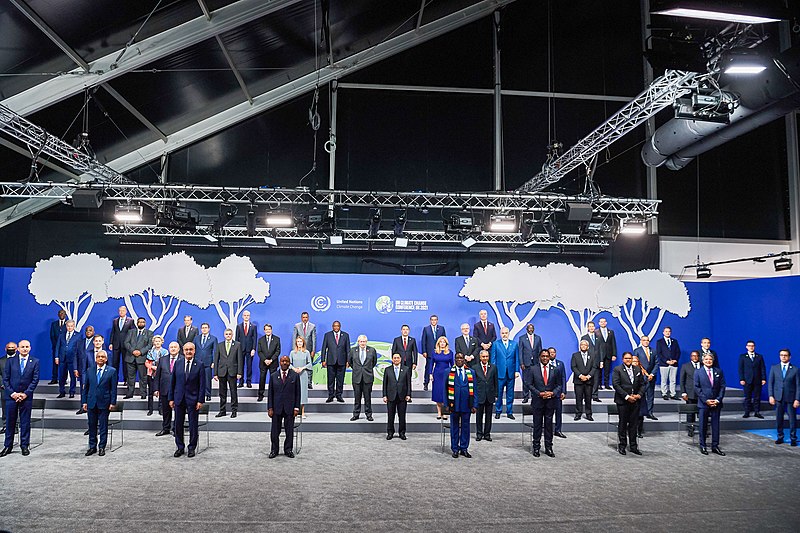The countries under the European Union came to an agreement this week on raising their target in curbing greenhouse gas emissions next year. The agreement comes ahead of the upcoming United Nations summit on climate change.
The bloc’s climate ministers Monday agreed to their joint negotiating stance in the UN climate change summit in November. The upcoming summit was initially supposed to be the deadline for nearly 200 countries to raise their climate pledges. Most countries have yet to propose new targets.
The 27-member bloc, which makes them the third-largest polluter in the world, pledged to upgrade its target “as soon as possible.” However, the bloc said this could not be done until the bloc is done with negotiations on new climate emissions laws. The EU countries agreed to finish negotiations by the end of the year, which may be a tight deadline for the laws that include banning new fossil fuel car sales by 2035 and reforms to the EU carbon market.
EU officials told Reuters that the bloc was looking to land deals on three policies ahead of the COP27 summit that will take place on November 7. The bloc’s current target is to cut emissions by 55 percent by 2030 from levels in the 1990s. EU officials are hoping that it would be possible to raise the target due to the package of climate policies made in July of 2021 to deliver the current target of 55 percent.
The ministers also agreed that the bloc would support “loss and damage,” which is compensation for the damage caused by natural disasters such as floods and rising sea levels, among others that are a result of climate change that would affect the poorest.
“The EU has to be the bridge builder and you can only build bridges if you are seen as ambitious yourself,” said the bloc’s climate policy chief Frans Timmermans Monday, referring to the three policies that are being fast-tracked.
Aside from a ban on new fossil fuel car sales by 2035 along with binding national emissions-cutting goals, the other policy involves expanding the continent’s natural CO2-absorbing “sinks” such as forests. The sinks law is seen as a roundabout way to increase the EU’s climate target as it would cut the countries’ overall emissions by 57 percent if achieved.



 Trump Lifts 25% Tariff on Indian Goods in Strategic U.S.–India Trade and Energy Deal
Trump Lifts 25% Tariff on Indian Goods in Strategic U.S.–India Trade and Energy Deal  U.S. to Begin Paying UN Dues as Financial Crisis Spurs Push for Reforms
U.S. to Begin Paying UN Dues as Financial Crisis Spurs Push for Reforms  US Pushes Ukraine-Russia Peace Talks Before Summer Amid Escalating Attacks
US Pushes Ukraine-Russia Peace Talks Before Summer Amid Escalating Attacks  U.S. Lawmakers to Review Unredacted Jeffrey Epstein DOJ Files Starting Monday
U.S. Lawmakers to Review Unredacted Jeffrey Epstein DOJ Files Starting Monday  Norway Opens Corruption Probe Into Former PM and Nobel Committee Chair Thorbjoern Jagland Over Epstein Links
Norway Opens Corruption Probe Into Former PM and Nobel Committee Chair Thorbjoern Jagland Over Epstein Links  TrumpRx.gov Highlights GLP-1 Drug Discounts but Offers Limited Savings for Most Americans
TrumpRx.gov Highlights GLP-1 Drug Discounts but Offers Limited Savings for Most Americans  Jack Lang Resigns as Head of Arab World Institute Amid Epstein Controversy
Jack Lang Resigns as Head of Arab World Institute Amid Epstein Controversy  South Korea Assures U.S. on Trade Deal Commitments Amid Tariff Concerns
South Korea Assures U.S. on Trade Deal Commitments Amid Tariff Concerns  Japan Election 2026: Sanae Takaichi Poised for Landslide Win Despite Record Snowfall
Japan Election 2026: Sanae Takaichi Poised for Landslide Win Despite Record Snowfall  Trump Endorses Japan’s Sanae Takaichi Ahead of Crucial Election Amid Market and China Tensions
Trump Endorses Japan’s Sanae Takaichi Ahead of Crucial Election Amid Market and China Tensions  Trump’s Inflation Claims Clash With Voters’ Cost-of-Living Reality
Trump’s Inflation Claims Clash With Voters’ Cost-of-Living Reality  U.S. Announces Additional $6 Million in Humanitarian Aid to Cuba Amid Oil Sanctions and Fuel Shortages
U.S. Announces Additional $6 Million in Humanitarian Aid to Cuba Amid Oil Sanctions and Fuel Shortages  Trump Signs Executive Order Threatening 25% Tariffs on Countries Trading With Iran
Trump Signs Executive Order Threatening 25% Tariffs on Countries Trading With Iran  Nighttime Shelling Causes Serious Damage in Russia’s Belgorod Region Near Ukraine Border
Nighttime Shelling Causes Serious Damage in Russia’s Belgorod Region Near Ukraine Border  Trump Allegedly Sought Airport, Penn Station Renaming in Exchange for Hudson River Tunnel Funding
Trump Allegedly Sought Airport, Penn Station Renaming in Exchange for Hudson River Tunnel Funding  Trump Says “Very Good Talks” Underway on Russia-Ukraine War as Peace Efforts Continue
Trump Says “Very Good Talks” Underway on Russia-Ukraine War as Peace Efforts Continue  Trump Backs Nexstar–Tegna Merger Amid Shifting U.S. Media Landscape
Trump Backs Nexstar–Tegna Merger Amid Shifting U.S. Media Landscape 































